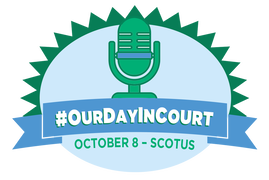
by Jeff B. White
On October 8, the U.S. Supreme Court will hear oral arguments for three cases: Altitude Express v. Zarda, Bostock v. Clayton County, GA, and R.G. & G.R. Harris Funeral Homes v. EEOC and Aimee Stephens. These cases concern existing protections LGBTQ+ people currently have in employment
On October 8, the U.S. Supreme Court will hear oral arguments for three cases: Altitude Express v. Zarda, Bostock v. Clayton County, GA, and R.G. & G.R. Harris Funeral Homes v. EEOC and Aimee Stephens. These cases concern existing protections LGBTQ+ people currently have in employment
Altitude Express v. Zarda This case concerns employment discrimination based on sexual orientation. After revealing his sexual orientation to a customer at the skydiving business where he worked on Long Island, NY, Don Zarda was fired. Don sued the company but a federal trial court rejected his discrimination claim. Tragically, in October 2014, Zarda died unexpectedly, but the case continued on behalf of his family. In February 2018, the full Second Circuit Court of Appeals ruled that discrimination based on sexual orientation is a form of discrimination based on sex that is prohibited under Title VII of the Civil Rights Act of 1964. The court recognized that when a lesbian, gay, or bisexual person is treated differently because of discomfort or disapproval that they are attracted to people of the same sex, that’s discrimination based on sex. In April, 2019 the U.S. Supreme Court agreed to hear the case. Find out more here.
Bostock v. Clayton County, GA This case also concerns employment discrimination based on sexual orientation. Gerald Lynn Bostock was fired from his job as a county child welfare services coordinator in Georgia when his employer learned he is gay. In May 2018, the Eleventh Circuit Court of Appeals refused to reconsider an outdated 1979 decision wrongly excluding sexual orientation discrimination from coverage under Title VII’s ban on sex discrimination and denied his appeal. Find out more here.
R.G. & G.R. Harris Funeral Homes v. EEOC and Aimee Stephens This case concerns employment discrimination based on gender identity or expression. Aimee Stephens worked as a funeral director at R.G. & G.R. Harris Funeral Homes in Michigan. When she informed the funeral home’s owner that she is transgender and planned to come to work as the woman she is, her employer fired her, saying it would be “unacceptable” for her to appear and behave as a woman. The Sixth Circuit Court of Appeals ruled in March 2018 that when the funeral home fired her for being transgender, it violated Title VII of the Civil Rights Act of 1964—the federal law prohibiting sex discrimination in employment. Aimee was the same capable employee before and after her transition, but she was fired because she took steps to be the woman she is. That’s sex discrimination. In April, 2019 the U.S. Supreme Court agreed to hear the case. Find out more here.
One of the fundamental values underpinning our nation is that all people should be able to make a living and support themselves without fear of discrimination at work! On October 8, those who support employment protections for LGBTQ+ people will gather in the nation’s capital to give a face and voice to the overwhelming majority of Americans everywhere who believe in this right. Join us as we rally on the steps of the U.S. Supreme Court as we show the nation that we believe that all Americans deserve to be treated fairly and equally under the law.
There are free buses from NYC and possibly from Philly, you can sign up here for those.
Bostock v. Clayton County, GA This case also concerns employment discrimination based on sexual orientation. Gerald Lynn Bostock was fired from his job as a county child welfare services coordinator in Georgia when his employer learned he is gay. In May 2018, the Eleventh Circuit Court of Appeals refused to reconsider an outdated 1979 decision wrongly excluding sexual orientation discrimination from coverage under Title VII’s ban on sex discrimination and denied his appeal. Find out more here.
R.G. & G.R. Harris Funeral Homes v. EEOC and Aimee Stephens This case concerns employment discrimination based on gender identity or expression. Aimee Stephens worked as a funeral director at R.G. & G.R. Harris Funeral Homes in Michigan. When she informed the funeral home’s owner that she is transgender and planned to come to work as the woman she is, her employer fired her, saying it would be “unacceptable” for her to appear and behave as a woman. The Sixth Circuit Court of Appeals ruled in March 2018 that when the funeral home fired her for being transgender, it violated Title VII of the Civil Rights Act of 1964—the federal law prohibiting sex discrimination in employment. Aimee was the same capable employee before and after her transition, but she was fired because she took steps to be the woman she is. That’s sex discrimination. In April, 2019 the U.S. Supreme Court agreed to hear the case. Find out more here.
One of the fundamental values underpinning our nation is that all people should be able to make a living and support themselves without fear of discrimination at work! On October 8, those who support employment protections for LGBTQ+ people will gather in the nation’s capital to give a face and voice to the overwhelming majority of Americans everywhere who believe in this right. Join us as we rally on the steps of the U.S. Supreme Court as we show the nation that we believe that all Americans deserve to be treated fairly and equally under the law.
There are free buses from NYC and possibly from Philly, you can sign up here for those.

 RSS Feed
RSS Feed
